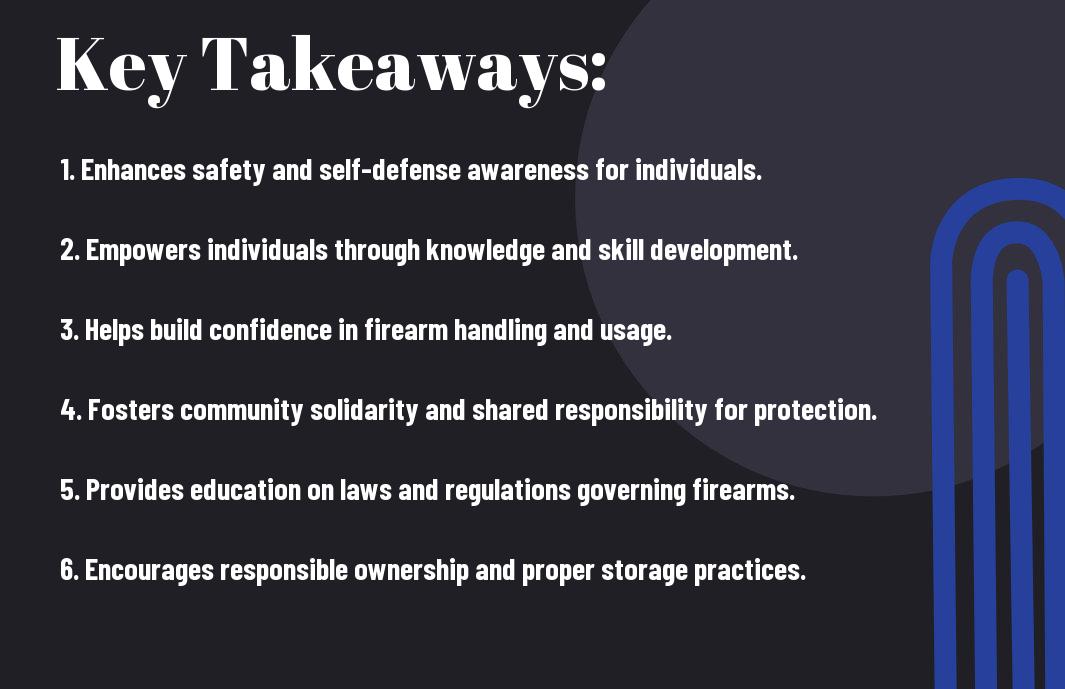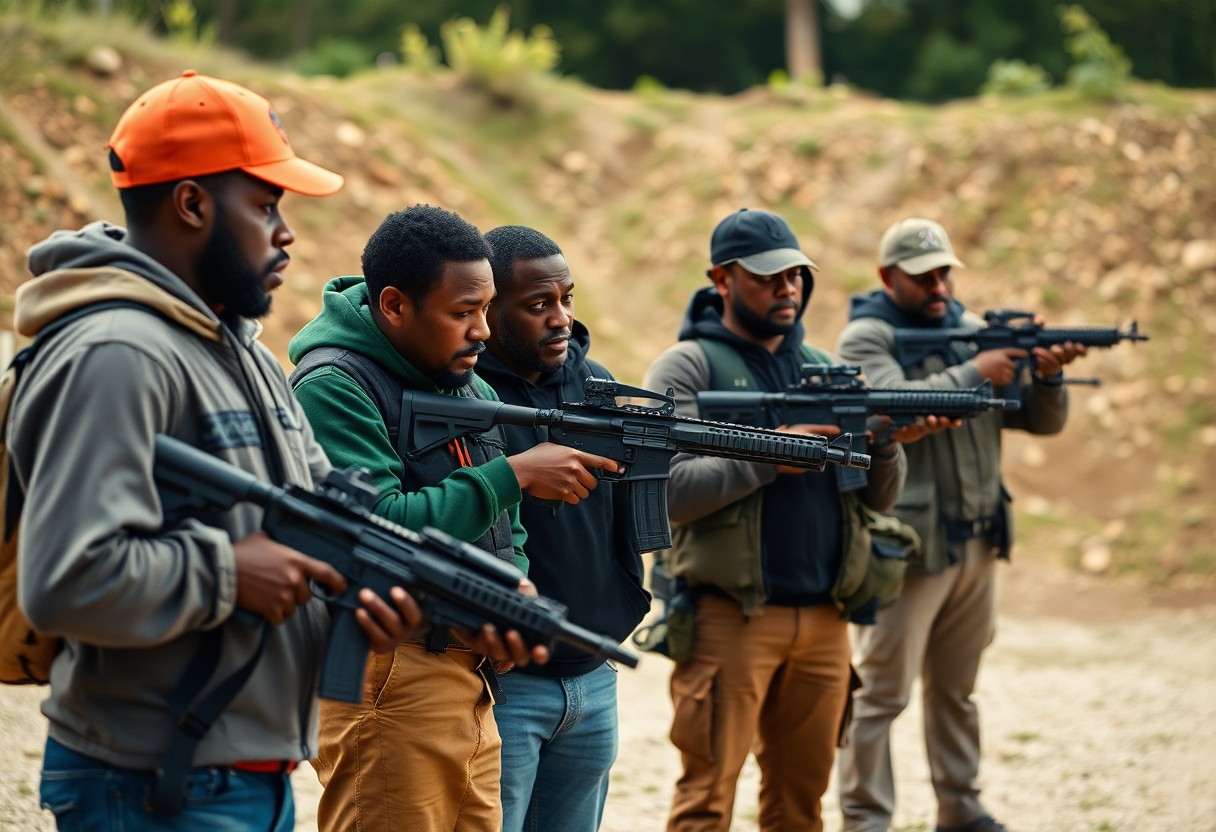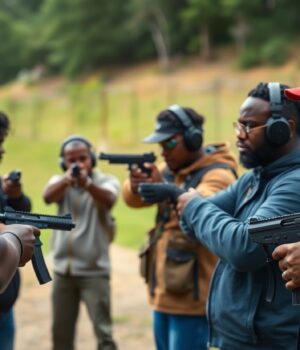Many individuals in the Black community may overlook the importance of firearms training, yet it holds significant value in enhancing personal safety and empowerment. By engaging in proper training, you equip yourself with imperative skills and knowledge that can greatly impact your life, your family, and your community. This blog post outlines ten compelling reasons to consider firearms training, which can help you make informed decisions about personal safety and advocacy for responsible gun ownership.
Key Takeaways:
- Empowerment: Firearms training enhances individuals’ confidence and self-defense skills, enabling members of the Black community to feel more secure in their personal safety.
- Education: Understanding the laws and responsibilities associated with firearm ownership helps to promote responsible usage and reduces the risk of unintentional incidents.
- Community Safety: Collective training efforts foster a sense of unity and shared responsibility, helping to build a safer environment within communities.


Historical Context of Firearms in the Black Community
For decades, firearms have played a significant role in the Black community, reflecting the struggle for self-defense and autonomy in a society often marked by systemic oppression. Understanding this historical context allows you to appreciate the complex relationship between African Americans and firearms, which has evolved from a means of protection against violence to a tool for empowerment. By looking back at the past, you can gain insight into the importance of responsible gun ownership and training today.
Impact of Historical Disenfranchisement
On various occasions throughout history, the Black community faced discriminatory laws and practices that stripped away your rights to protect and defend yourselves. From the Jim Crow era to the present day, these measures left many vulnerable to violence and oppression. As a result, the push for gun ownership emerged as a form of resistance, asserting your right to safety and autonomy in a society that has often denied you both.
The Legacy of Non-Violence and Self-Defense
By embracing principles of non-violence while also recognizing the necessity for self-defense, you navigate the delicate balance between advocacy for peace and the need for protection. Historical figures, such as Martin Luther King Jr., promoted non-violence, yet many others, including the Black Panther Party, emphasized armed self-defense against aggression and oppression. This diversity of thought illustrates that both approaches can coexist, empowering you to choose your path toward justice while remaining aware of the tools available for personal and communal safety.
This legacy influences your perspective on firearms training and ownership today. Acknowledging the historical significance of both non-violence and self-defense allows you to understand the depth of responsibility that comes with firearm ownership. Embracing this legacy strengthens your resolve to protect yourself and your community, while also advocating for peaceful solutions to persistent issues. As you engage in firearms training, you honor those who fought for your rights and empower yourself for a safer future.
Safety and Self-Defense
It is imperative for everyone, particularly in the Black community, to prioritize safety and self-defense through firearms training. The skills you learn can empower you to respond effectively in dangerous situations, enhancing your overall sense of security. By participating in training programs, you sharpen your decision-making abilities and increase your confidence, allowing you to protect yourself and your loved ones when necessary.
Personal Protection Strategies
To ensure your safety, it’s important to have a plethora of personal protection strategies in place. These strategies encompass everything from situational awareness to self-defense techniques. By understanding how to assess your surroundings and recognize potential threats, you elevate your capacity to maintain control in various scenarios, ultimately fostering a safer environment for yourself and your community.
Understanding the Criminal Landscape
One key aspect of firearms training is gaining insight into the criminal landscape around you. Understanding the types of threats, local crime trends, and the behaviors of potential offenders enables you to devise more effective self-defense plans. This knowledge ensures you remain vigilant and prepared, allowing you to mitigate risks and respond appropriately in unexpected situations.
Self-defense requires more than just physical preparedness; it demands a comprehensive understanding of the environment you navigate daily. By familiarizing yourself with crime statistics and local dynamics, you can identify areas where heightened awareness is needed. Awareness of prevalent criminal activities helps you set realistic boundaries and make informed decisions, ensuring your safety remains a top priority in your everyday life.
Empowerment Through Knowledge
Now more than ever, understanding firearms and their safe usage empowers you and your community. Gaining knowledge about firearms not only enhances personal safety but also fosters a sense of responsibility and confidence. It allows you to actively participate in conversations and initiatives surrounding gun safety and legislation, creating a more informed community that values protection and empowerment.
Building Confidence with Firearms
With proper training and education, you can build the confidence necessary to handle firearms safely and effectively. This confidence extends beyond the use of firearms; it encourages you to become a proactive advocate for your safety and that of your loved ones. Feeling equipped to manage firearms can transform fear into empowerment, enabling you to navigate various situations with assurance.
Educating the Community
Knowledge is power, and educating those around you about firearms is vital for fostering a safe environment. By sharing information on safe practices and responsible ownership, you contribute to creating a culture of safety and awareness in your community.
It is important to engage in community training programs and workshops that provide education about firearms. By facilitating discussions about gun safety, you help dispel myths, reduce fear, and promote handling skills. This collective effort ensures everyone in your community is equipped with the knowledge needed to make informed decisions, ultimately enhancing overall safety and reducing incidents related to firearms.
Legal Awareness
To engage with firearms effectively, having a solid understanding of the legal framework surrounding gun ownership and usage is vital. Being informed can protect you and your loved ones, ensuring that you navigate through complex laws without inadvertently breaking them. Without proper knowledge, you risk facing severe legal consequences that could impact your life and community.
Navigating Firearm Laws
Any firearm owner must familiarize themselves with both federal and state laws governing gun ownership, possession, and use. These laws can vary dramatically depending on where you live, making it imperative that you stay updated on the regulations specific to your area. Ignorance of these laws can lead to unintended violations, which might result in serious legal repercussions.
Rights and Responsibilities
One of the fundamental aspects of firearm ownership is understanding the rights and responsibilities that come with it. It’s not just about owning a weapon; you must also recognize the legal duties that accompany it. This includes safely storing your firearms, knowing when and where you can carry them, and understanding the conditions under which you can legally use them.
At its core, the relationship between rights and responsibilities is about ensuring safety within your community while exercising your Second Amendment rights. You are responsible for the actions taken with the firearm you own; this includes understanding when self-defense is justified and how to handle the firearm in compliance with the law. Being knowledgeable about these aspects equips you with the authority of being a responsible gun owner, fostering a culture of safety in the Black community.
Community Cohesion
All members of the Black community can benefit from firearms training by creating a sense of unity and purpose. When individuals come together to build their skills, they not only enhance their own safety but also contribute to a collective strength that can reshape perceptions and foster resilience. This shared experience promotes understanding and respect among individuals, helping to break down barriers and create lasting bonds that extend beyond the training sessions.
Fostering Relationships Through Training
The process of firearms training presents a unique opportunity for individuals to meet and interact with others who share similar perspectives and experiences. By engaging in this shared learning environment, you can develop meaningful connections with fellow participants, fostering friendships that may extend into your everyday life. Together, you can support one another in building knowledge and skills, ultimately strengthening your community as a whole.
Building Trust and Support Networks
Before becoming proficient in firearms, it’s vital that you work alongside others to establish trust and reliable support systems. Training encourages this collaboration and communication, allowing individuals to learn from one another and share their experiences. Over time, this bond can transform into a robust network that empowers you to feel secure in your community, knowing you have others to lean on for assistance and guidance.
With consistent engagement in firearms training, you have the opportunity to cultivate a strong network of support among peers who value safety and empowerment. As you build relationships through shared experiences, you’ll find reassurance in knowing that you can rely on these connections in times of need. This sense of community enhances your overall well-being and encourages a culture of mutual respect, ultimately creating a safer environment for everyone.
Reducing Gun Violence
Not addressing firearms training within the Black community can contribute to escalating gun violence. By equipping individuals with the knowledge and skills necessary to handle firearms responsibly, you can foster a culture of safety and accountability. This education empowers you to make informed decisions, reduces accidental discharges, and ultimately works towards a decrease in gun-related incidents. As you build expertise, you contribute to safer communities and nurture a sense of responsibility among peers.
Promoting Responsible Ownership
To create a safer environment, responsible ownership is necessary. Understanding the legalities and responsibilities that come with firearms ownership enables you to act ethically and judiciously. By prioritizing training, you are making a commitment to safeguard your community while exercising your rights.
Engaging Youth in Positive Activities
An necessary aspect of reducing gun violence is engaging youth in constructive activities. By providing alternatives to violence, you help steer young individuals away from criminal behavior and towards community-building endeavors. Through mentorship and recreational programs, you foster a sense of belonging and purpose among youth.
Also, it’s important to recognize that engaging youth in positive activities not only builds their confidence but also instills vital life skills. When you involve them in sports, arts, or educational programs, you create an environment where they can thrive and develop strong social connections. These activities can act as a powerful deterrent to gun violence, allowing young people to envision a future filled with possibilities rather than conflicts. Ultimately, investing in youth today means investing in a safer, more prosperous community tomorrow.
Summing up
Summing up, understanding the importance of firearms training can greatly empower you and your community. By focusing on safety, responsibility, and self-defense, you equip yourself with the skills necessary to navigate a world where awareness can make all the difference. Additionally, engaging in firearms education fosters a sense of unity and advocacy, enabling you to contribute positively to conversations around gun ownership and safety. Ultimately, investing time in training isn’t just about handling a firearm; it’s about building resilience, awareness, and confidence in yourself and your community.
FAQ
Q: Why is firearms training important for the Black community specifically?
A: Firearms training is important for the Black community as it empowers individuals with the knowledge and skills necessary for responsible gun ownership and self-defense. This training can help address concerns related to personal safety, enabling community members to protect themselves and their loved ones in potentially dangerous situations. Furthermore, understanding firearm laws and safety practices fosters confidence and promotes a culture of responsible gun ownership within the community.
Q: How can firearms training help reduce violence in the Black community?
A: Engaging in firearms training can help reduce violence by educating individuals on conflict resolution, de-escalation tactics, and the importance of responsible firearm usage. Training programs often emphasize non-violent solutions to conflicts, which can lead to a decrease in impulsive reactions that may turn violent. Additionally, well-trained individuals are more likely to communicate effectively during potentially harmful situations, creating an environment that prioritizes safety and peace over aggression.
Q: What role does firearms training play in community building?
A: Firearms training plays an important role in community building by fostering unity and cooperation among participants. When community members come together for training sessions, they not only share knowledge but also build trust and relationships with one another. Many training programs also encourage mentorship, allowing experienced members to guide newcomers and share best practices. This collective learning experience can help strengthen community ties and create a supportive network that advocates for safety, solidarity, and responsible gun ownership.








